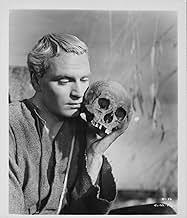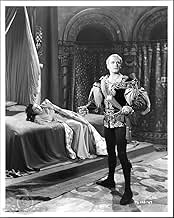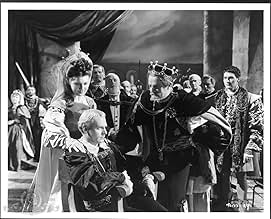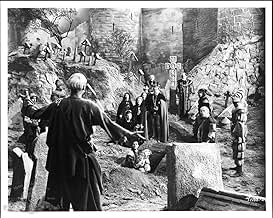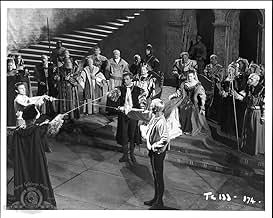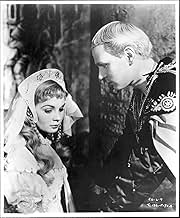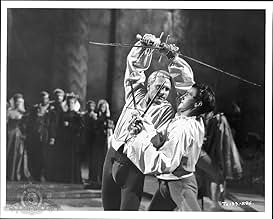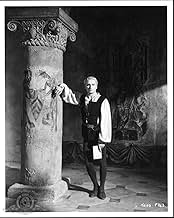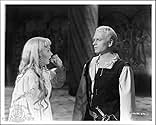El príncipe Hamlet se debate entre matar o no a su tío, quien sospecha que ha asesinado a su padre, el antiguo rey.El príncipe Hamlet se debate entre matar o no a su tío, quien sospecha que ha asesinado a su padre, el antiguo rey.El príncipe Hamlet se debate entre matar o no a su tío, quien sospecha que ha asesinado a su padre, el antiguo rey.
- Dirección
- Guionistas
- Elenco
- Ganó 4 premios Óscar
- 18 premios ganados y 6 nominaciones en total
- Undetermined Secondary Role
- (sin créditos)
- Dirección
- Guionistas
- Todo el elenco y el equipo
- Producción, taquilla y más en IMDbPro
Opiniones destacadas
Of course the play is noticeably cut. I confess I miss Hamlet's passionate soliloquy `Is not this monstrous that this player here ', and also Rosencrantz and Guildenstern (they are important, for Hamlet faces the treachery of friends in their part). On the other hand more complete versions are rather overlong. I am not sure that Branagh's four hours movie gains anything from using the full text. This film is dynamic and worth seeing not only for the sake of Lord Laurence's outstanding performance, but because it is extraordinary interesting version of the familiar play.
Like the Zeffrilli/Gibson and Branaugh versions of Shakespeare's classic that followed, Olivier's adaptation is a mostly excellent film with several annoying flaws keeping it just out of reach of greatness.
Olivier is superb as Hamlet --- especially when delivering the soliloquies, several of which are genuinely powerful. The rest of the cast, however, is a mixed bag. Herlie is very good, managing to completely overcome that fact that she is really 13 years younger than Olivier. Sydney has his moments and does a decent job, but never really gets across who Claudius really is. Aymer is amusing but nothing more. Simmons makes a good Ophelia, albeit not a great one. Norman Wooland is excellent as Horatio (which is a tough role to actually be memorable in). Stanley Holloway is good as the Gravedigger, but somehow he doesn't nail the part the way Billy Crystal did in the 1996 version. Finally, Peter Cushing is odd as Osric. The rest of the cast is either stiff or completely uninteresting.
However, other than some weak performances, Olivier does a superb job directing everything. The atmosphere during the ghost scenes is absolutely suffocating and starts the film off well. And right from that scene, it's obvious that the camera work is going to be awesome. The camera moves and sweeps everywhere --- but not just for the sake of moving and sweeping like many movies (coughMichaelBaycoughcough). It creates extraordinary images and energy that make many scenes unforgettable --- without calling too much attention to itself.
William Walton's creepy music adds a lot.
Finally, the climactic fencing scenes are genuinely great easily the best fencing scenes in a version of Hamlet and possibly among the best in film history.
However, despite many great scenes, the movie never creates the emotions it needs to really make the blows come. Yes, some scenes are truly compelling, but on the whole, it misses the mark in that department.
However, the scenes that work are brilliant, and despite the lack of emotional power, it is an entertaining and superbly made film that's just as worthwhile as its 90's successors (although it is marginally inferior to them, which is odd --- the 40's version inferior to the 90's remakes!).
Hamlet is one of the most complex and fascinating characters ever created, and no two great actors ever play him quite the same way. Olivier portrays him primarily as "a man who could not make up his mind", and his fine and often subtle acting brings to his role a deep understanding of his character's inner struggles and dilemmas, both moral and practical. He renders Hamlet's most famous lines in a distinctive way that reveal the many possible paths in Hamlet's future. It is a performance not to be forgotten.
If Olivier the actor is masterful, Olivier the director is good but not perfect. A great deal of Shakespeare's text was eliminated, getting the running time down to 2 1/2 hours, but even so there are times when the movie seems rather slow-moving, especially in the first hour or so. Most of the cuts involve interactions with the minor characters, and some of the original play's minor roles are cut completely out of the film. The result is to concentrate the emphasis even further on Hamlet himself and on his pessimistic meditations. While this enables Olivier's fine acting to become even more prominent, it does eliminate some very interesting portions of the story whose absence will be regretted by those viewers who love the play.
Olivier does add some good touches, though. He emphasizes the somber tone with numerous tracking shots of the castle's gloomy corridors and staircases. The filming of the famous sequence of events at the end is very good, and is much livelier than the rest.
While this is probably not the very best interpretation of the play "Hamlet", it is as good an interpretation of the character Hamlet as you will ever see. For that reason alone it is must viewing for any fan of Shakespeare or of Olivier.
Oscars Best Picture Winners, Ranked
Oscars Best Picture Winners, Ranked
¿Sabías que…?
- TriviaWhen the movie was released, Sir Laurence Olivier said it had been filmed in black and white for artistic reasons. The true reason, as he later admitted, was that "I was in the middle of a furious row with Technicolor".
- ErroresA clock is heard chiming the half-hour in Westminster chimes. If chiming clocks were invented at the time of the action they wouldn't sound the Westminster chimes which date only - as the name suggests - from the installation of the Big Ben clock in 1859.
- Citas
Hamlet, Prince of Denmark: To be, or not to be: that is the question: Whether 'tis nobler in the mind to suffer the slings and arrows of outrageous fortune, Or to take arms against a sea of troubles, And by opposing end them? To die: to sleep; No more; and by a sleep to say we end The heart-ache and the thousand natural shocks That flesh is heir to, 'tis a consummation Devoutly to be wish'd. To die, to sleep; To sleep: perchance to dream: ay, there's the rub; For in that sleep of death what dreams may come When we have shuffled off this mortal coil, Must give us pause: there's the respect That makes calamity of so long life; For who would bear the whips and scorns of time, The oppressor's wrong, the proud man's contumely, The pangs of despised love, the law's delay, The insolence of office and the spurns That patient merit of the unworthy takes, When he himself might his quietus make With a bare bodkin? Who would fardels bear, To grunt and sweat under a weary life, But that the dread of something after death, The undiscover'd country from whose bourn No traveller returns, puzzles the will And makes us rather bear those ills we have Than fly to others that we know not of? Thus conscience does make cowards of us all; And thus the native hue of resolution Is sicklied o'er with the pale cast of thought, And enterprises of great pith and moment With this regard their currents turn awry, And lose the name of action.
- Créditos curiososOpening credits prologue:
So oft it chances in particular men That through some vicious mole of nature in them, By the o'ergrowth of some complexion Oft breaking down the pales and forts of reason, Or by some habit grown too much; that these men - Carrying, I say, the stamp of one defect, Their virtues else - be they as pure as grace, Shall in the general censure take corruption From that particular fault.
- ConexionesEdited into Histoire(s) du cinéma: Une vague nouvelle (1999)
Selecciones populares
Detalles
- Fecha de lanzamiento
- País de origen
- Idioma
- También se conoce como
- Гамлет
- Locaciones de filmación
- D&P Studios, Denham, Uxbridge, Buckinghamshire, Inglaterra, Reino Unido(studio: made at D&P Studios)
- Productora
- Ver más créditos de la compañía en IMDbPro
Taquilla
- Presupuesto
- GBP 500,000 (estimado)
- Tiempo de ejecución
- 2h 34min(154 min)
- Color
- Relación de aspecto
- 1.37 : 1


